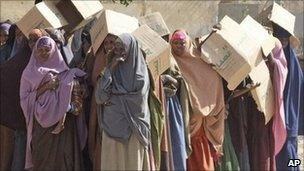East Africa faces 'world's worst food security crisis'
- Published

Some households "are unable to access the basic food supplies", Fewsnet warns
The world's worst food security crisis is continuing in the eastern Horn of Africa, a US agency has warned.
The Famine Early Warning Systems Network (Fewsnet) said areas of particular concern were in Ethiopia, Kenya and Somalia.
It said large-scale emergency assistance was urgently needed "to save lives and treat acute malnutrition" in the region.
It also stressed that the current humanitarian response was "inadequate".
In a statement, Fewsnet said, external the eastern Horn of Africa "has experienced two consecutive seasons of significantly below-average rainfall, resulting in one of the driest years since 1995".
It said that crops had failed and local cereal prices remained very high.
"This is the most severe food security emergency in the world today," the statement said.
In southern Ethiopia and some pastoral areas of Somalia, the agency said, "poor households are unable to access the basic food supplies needed for survival".
Fewsnet also said that recent nutrition surveys suggested that global acute malnutrition remained above 20% in the region, and more than seven million people needed humanitarian assistance.
In Kenya, the government has declared the drought and food crisis a national disaster.
In late May, consumers in the country took the government to court in a landmark case, claiming that their constitutional right to be free from hunger had been violated.
Every Kenyan's right to "be free from hunger and to have adequate food of acceptable quality" is protected in Article 43 of a new constitution, approved in a referendum last August.
The BBC's international development correspondent, Mark Doyle, says that in another sign of the severity of the crisis, farmers in the region are so desperate to raise funds that they are selling scrawny livestock - which represent their biggest asset - at low prices.
- Published26 May 2011
- Published24 January 2011
- Published15 February 2011